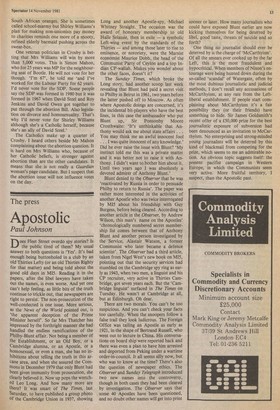The press
Apostolic
Paul Johnson
Does Fleet Street overdo spy stories? Is the public tired of them? My usual answer to both questions is 'Yes'. It's bad enough being buttonholed in a club by an old Thirties Lefty (or an old Thirties Righty for that matter) and being told about the good old days in MI5. Reading it in the papers, after the libel lawyers have taken out the names, is even worse. And yet one can't help feeling, as little bits of the truth continue to trickle out, that newspapers are right to persist. The non-prosecution of the well-connected is one issue. More serious, as the News of the World pointed out, is 'the apparent deception of the Prime Minister herself'. So far Mrs Thatcher has impressed by the forthright manner she had handled the endless ramifications of the Philby-Blunt affair. Not being a member of the Establishment, or an Old Boy, or a Cambridge alumna, or an Apostle, or a homosexual, or even a man, she has no inhibitions about telling the truth in this arcane area, and when she assured the Commons in December 1979 that only Blunt had been given immunity from prosecution, she Clearly believed it. Now up pops the wretched Leo Long. And how many more are there? It was smart of The Times, last Saturday, to have published a group photo of the Cambridge Union in 1937, showing Long and another Apostle-spy, ,Michael Whitney Straight. The occasion was the award of honorary membership to old Haile Selassie, then in exile — a symbolic Left-wing event by the standards of the Thirties — and among those later to rise to eminence, or notoriety, were the Marxist economist Maurice Dobb, the head of the Communist Party of Ceylon and a top Indian CP-wallah. Makes you wonder about the other faces, doesn't it?
The Sunday Times, which broke the Long story, had another scoop last week revealing that Blunt had paid a secret visit to Philby in Beirut in 1961, two years before the latter pushed off to Moscow. As often where Apostolic doings are concerned, it's the incidental bit-players who have the best lines, in this case the ambassador who put Blunt up, Sir Ponsonby Moore Crosthwaite: 'It's unthinkable that Anthony would ask me about state affairs . . . You may think me an awful innocent fool . . . I was quite innocent of any knowledge.' Did he ever raise the issue with Blunt? 'My instinct told me this was a private matter and it was better not to raise it with Anthony. I didn't want to bother him about it. Until two years ago I was absolutely a devoted admirer of Anthony Blunt.'
Blunt denied to the Observer that he was 'reactivated by Russia in order to persuade Philby to return to Russia'. The paper was rather more interested in the activities of another Apostle who was twice interrogated by MIS about his friendship with Guy Burgess, before being cleared. According to another article in the Observer, by Andrew Wilson, this man's name on the Apostles' `chronologically numbered secret membership list comes between that of Anthony Blunt and another person investigated by the Service, Alastair Watson, a former Communist who later became a defence scientist'. The Observer had a third article, taken from Nigel West's new book on MI5, pointing out that the security services had stumbled on the Cambridge spy ring as early as 1943, when two men, a linguist and his CP recruiter, very active in Thirties Cambridge, got seven years each. But the `Cambridge linguist' surfaced in The Times on Tuesday. He wasn't at Cambridge at all, but at Edinburgh. Oh dear.
There are two morals. You can't be too suspicious. And you can't check your facts too carefully. When the snoopers follow a false trail they look ludicrous. The Foreign Office was tailing an Apostle as early as 1921, in the shape of Bertrand Russell, who went out to lecture in China. His conversations on board ship'were reported back and there was even a plan to have him arrested and deported from Peking under a wartime order-in-council. It all seems silly now, but who was to know at the time? There's also the question of newspaper ethics. The Observer and Sunday Telegraph introduced two new names into the controversy, though in both cases they had been cleared by investigation. The Observer says that some 40 Apostles have been questioned, and no doubt other names will get into print sooner or later. How many journalists who could have exposed Blunt earlier are now kicking themselves for being deterred by libel, good taste, threats of suicide and so forth?
One thing no journalist should ever be deterred by is the charge of `McCarthyism'. Of all the smears ever cooked up by the far Left, this is the most fraudulent and hypocritical. When members of Nixon's entourage were being hunted down during the so-called `scandal' of Watergate, often by the most dubious journalistic and judicial methods, I don't recall any accusations of McCarthyism, at any rate from the Leftliberal establishment. If people start complaining about McCarthyism it's a fair possibility they (or their friends) have something to hide. Sir James Goldsmith's recent offer of a £50,000 prize for the best journalistic exposure of subversion had been denounced as an invitation to McCarthyism. No enterprising and strong-minded young journalists will be deterred by this kind of blackmail from competing for the prize, which seems to me an admirable notion. An obvious topic suggests itself: the present pacifist campaign in Western Europe, in which the Communists seem very active. More fruitful territory, I suspect, than the Apostolic past.


































 Previous page
Previous page